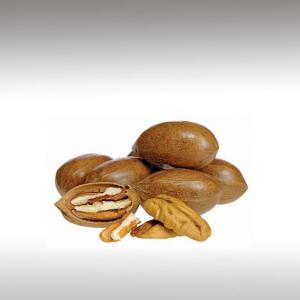
PECANS OIL (CARYA ILLINOINENSIS) - BASE OILS

BASE / GENERAL DATA
Information submited: October 1, 2014 Modified: May 9, 2018 By: OperaDreamhouse
The Pecan is a species of hickory native to Mexico and southcentral and southeastern United States. "Pecan" is from an Algonquian word meaning a nut requiring a stone to crack.
Before European settlement, Pecans were widely consumed and traded by Native Americans. As a food source, pecans are a natural choice for preagricultural society. They can provide two to five times more calories per unit weight than wild game, and require no preparation.
Pecans first became known to Europeans in the 16th century. The first Europeans to come into contact with pecans were Spanish explorers in what is now Mexico, Texas, and Louisiana. These Spanish explorers called the pecan, "Tuerca de la Arruga", which roughly translates to, "Wrinkle nut" They were called this for their resemblance to wrinkles.
The Pecan tree is a large deciduous tree, growing to 20 - 40 m in height.
A Pecan, like the fruit of all other members of the hickory genus, is not truly a nut, but is technically a drupe, a fruit with a single stone or pit, surrounded by a husk. The husks are produced from the exocarp tissue of the flower, while the part known as the nut develops from the endocarp and contains the seed. The seeds of the Pecan are edible, with a rich, buttery flavor.
Pecan oil is an edible pressed oil extracted from the Pecan nut. Pecan oil is neutral in flavor and takes on the flavor of whatever seasoning is being used with it. Prior to extraction, the nuts are lightly roasted and ground. Mechanical extraction methods are then used to remove the oil. It can be extracted from raw or cooked Pecans.
Pecan oil is a light weight oil and is usually pale yellow in color. Pecan nuts contain about 65% to 70% oils.
Chemical structure:
Pecan oil contains 9,5% saturated fat, which is less than in Olive oil (13,5%), Peanut oil (16,90%) or Corn oil (12,70%).
Pecan oil is considered a healthy oil as it is rich in monounsaturated fats, specifically oleic acid, (52,0) and low in saturated fats. It also contains linoleic acid (36,6%), and small amounts of palmitic (7,1%), stearic (2,2%) and linolenic acids (1,5%).
Only Olive and Canola oils compare favorably with high quality cold pressed Pecans.
Before European settlement, Pecans were widely consumed and traded by Native Americans. As a food source, pecans are a natural choice for preagricultural society. They can provide two to five times more calories per unit weight than wild game, and require no preparation.
Pecans first became known to Europeans in the 16th century. The first Europeans to come into contact with pecans were Spanish explorers in what is now Mexico, Texas, and Louisiana. These Spanish explorers called the pecan, "Tuerca de la Arruga", which roughly translates to, "Wrinkle nut" They were called this for their resemblance to wrinkles.
The Pecan tree is a large deciduous tree, growing to 20 - 40 m in height.
A Pecan, like the fruit of all other members of the hickory genus, is not truly a nut, but is technically a drupe, a fruit with a single stone or pit, surrounded by a husk. The husks are produced from the exocarp tissue of the flower, while the part known as the nut develops from the endocarp and contains the seed. The seeds of the Pecan are edible, with a rich, buttery flavor.
Pecan oil is an edible pressed oil extracted from the Pecan nut. Pecan oil is neutral in flavor and takes on the flavor of whatever seasoning is being used with it. Prior to extraction, the nuts are lightly roasted and ground. Mechanical extraction methods are then used to remove the oil. It can be extracted from raw or cooked Pecans.
Pecan oil is a light weight oil and is usually pale yellow in color. Pecan nuts contain about 65% to 70% oils.
Chemical structure:
Pecan oil contains 9,5% saturated fat, which is less than in Olive oil (13,5%), Peanut oil (16,90%) or Corn oil (12,70%).
Pecan oil is considered a healthy oil as it is rich in monounsaturated fats, specifically oleic acid, (52,0) and low in saturated fats. It also contains linoleic acid (36,6%), and small amounts of palmitic (7,1%), stearic (2,2%) and linolenic acids (1,5%).
Only Olive and Canola oils compare favorably with high quality cold pressed Pecans.

SPIRITUAL PRACTISES DATA

MEDICINE / HEALTH DATA

BEAUTY / COSMETICS DATA

FOOD / COOKING DATA
COMMENTS
No comments.


